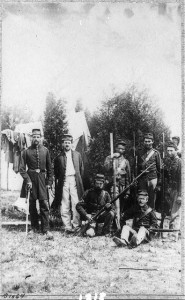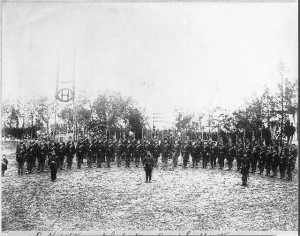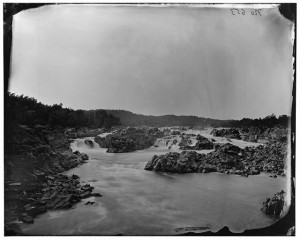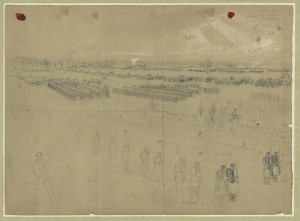Plenty of Time to Decorate Camp In Lieu of General Advance South
Captain Guion of Company A, New York 33rd Infantry Regiment describes his quarters, the regiment’s decorating mission, the 25 mile front, and the regiment’s non-fighting role during the Battle of Dranesville. He also has an interesting prediction for postbellum Virginia – not exactly northern carpetbaggers, but industrious northern farmers moving south to till Virginia’s rich soil. His description of the Old Dominion’s road system has the Battle of the Wilderness written all over it, I think.
Letter from Capt. Guion
CAMP GRIFFIN, VIRGINIA
Dec. 21st, 1861.
Dear Reveille: – A “seven by nine” cellar, three foot deep, “logged up” on top, and covered by a tent, makes a very comfortable habitation for the time being. And so, in the absence of any orders to advance, or go into Winter quarters the Grand Army, has made itself as comfortable as possible after the above plan. One day last week, our regiment was excused from the usual routine of duty, for the purpose of decorating the camp. Immediately the boys went to work, and before night its whole appearance was changed as if by magic. What before had been a bare hill, was become a forest of evergreens, and the white tents of the troops were almost hidden among the the heavy branches of the pine and cedar. A great deal of taste was displayed by the different companies in the decoration of their tents. Over the entrance of each, a handsome arch, surmounted by the letter of the company, and ornamented in various ways, was erected – all of which gave the camp a very beautiful and comfortable appearance.
How long we are to remain here is of course impossible to state. A general impression prevails, that an advance will be made about the first of January. There may be some truth in this, for unless an onward movement is made soon, it must be deferred until settled summer weather comes again. At present the roads are in excellent condition, and probably will remain so, while this splendid weather lasts. The troops are ready and anxious for battle, are as perfectly drilled as is necessary, and are in an excellent state of discipline. The health of the army never was so good as at present. About the first of February the “rainy season” commences, and then the roads will be impassable for Artillery or Transportation Waggons.
Our picket line has gradually advanced, and now extends from Great Falls on the Upper Potomac to Mt. Vernon on the lower, a distance of about twenty-five miles, requiring a force of over five thousand men to guard it. The system of picketing now adopted is so perfect in all its details, that it would be impossible for a person to cross the line at any point, without being detected.
The country about here is much wilder than I expected to find it in any part of the Old Dominion. Very little of the land is cultivated, – although the soil is excellent and capable of amply repaying the labor of an active, energetic farmer. Heavy forest of Oak, Chestnut, and Pine, covering thousands of acres, have been cleared off by by the advancing army. Military roads have have been built in all directions and a rich section of country opened to the enterprise of our northern farmers, who will undoubtedly occupy it, after we shall have conquered a peace, with its former owners. One great peculiarity of Virginia, is its roads. The State has built splendid turnpikes, and that is all. In the absence of crossroads, the whole country is cut up by innumerable lanes and bridle paths, leading in every imaginable direction, so that if one is not thoroughly posted, he is sure to be lost in their innumerable twistings and turnings. As for the people I can not say much about them. All the better class of Virginians have left their homes since the war broke out, leaving the most shiftless and lazy set of beings here that I have ever met. Lewinsville, and Falls Church, places that you so often see mentioned in the papers, are mere hamlets, unworthy the name of villages. – The first, three miles this side of Vienna, contains eight dwelling houses, a store, two churches and a blacksmith shop – all of which are entirely deserted. Falls Church, three miles south, on the Leesburg pike, consists of about a dozen houses, one or two shops, a store, and the church which gives the place its name. The latter is a very large edifice, built in the New England style and with its tall white spire is visible for miles around. It was for a time used as a barracks by the rebels, and but little of its interior arrangement remains. Six miles west of this, over the lines stands the church built by Lord Fairfax in 1632. In this edifice WASHINGTON was married. But little of the altar at which the ceremony, took place remains, the greater portion having been carried off by relic seekers. One mile below Falls Church stands Taylor’s Tavern, the headquarters of the 35th N.Y. Just below this stands a large fort, one of the forty-eight erected for the defense of Washington. From here you obtain a good view of Munson’s and Upton’s Hill a mile away, one in front, and the other off to the left, each crowned with an immense fort, protected by ditch and abbatis, from the embrasures of which long rows of sullen cannon looks frowningly toward Secessia, ready at any moment to belch forth their iron hail of shot and shell. A short distance below there is Bailey’s Cross Roads, the scene of the recent grand review. Six miles further on lies Alexandria and seven more brings you to Mt. Vernon.
Yesterday, just as we were ready for dinner the startling beat of the long roll sounded through the camp.Instantly all was excitement. Dinner was forgotten, and in a very few minutes, the whole regiment was formed in line of battle on the parade ground, ready for action. We immediately moved off in double quick time, which was kept up at intervals until we had advanced to Vienna, (6 miles). Here we halted and our brigade took up its position, on a rising ground overlooking the village. The Artillery was placed in position, long lines of cavalry were drawn up ready to move at a moments notice, and everything arranged for an encounter with the enemy who were momentarily expected, while all this was being done, heavy cannonading on our right announced the opening of the fight. Soon a courier arrived with the intelligence that Gen. McCall had engaged the enemy in strong force. For a time all was excitement. Our men chafed at the thought of remaining idle while a battle was going on so near them, and were impatient to be led on. But the order to move did not come, and after standing under arms for nearly four hours, the cannonading having meantime entirely ceased, we were ordered back to our quarters. The 33d remaining some distance in the rear, to cover the retreat, arriving finally in camp about nine o’clock, sadly disappointed in not having met the enemy. During the whole time we were out, the men acted with a steadiness, and prompt attention to orders, deserving of commendation, and could they have met the enemy, would have fought with a bravery and coolness, that must have ensured success. To day we received a general report of the affair, and learn that our troops were victorious, killing some sixty, and wounding a large number of the rebels, besides taking many prisoners, and a large amount of stores and arms.
Wishing you and your numerous readers a Merry Christmas, and a happy New Year, I will close, with the hope, that in my next, I may be enabled to give you an account of the coming “great battle,” and that it may result in a victory to our arms.
Ever yours,
GEO. M. GUION
For a ton of information about Camp Griffin check out All Not So Quiet Along the Potomac . Camp Griffin is one of the DC Lawyer’s tags on the left of the page.
George Murray Guion served with 33rd New York Infantry Regiment until 1862 when the 148th New York Infantry Regiment was formed. Guion served that regiment as a colonel.
Check out more about the 33rd NY at this site, which includes a photo of the regiment’s flag that had a hole blown through it at Chancellorsville.
You can see a photo of Colonel Guion from later in life at the 148th New York Volunteer Infantry. Cowan’s Auctions displays some George M. Guion memorabilia.





